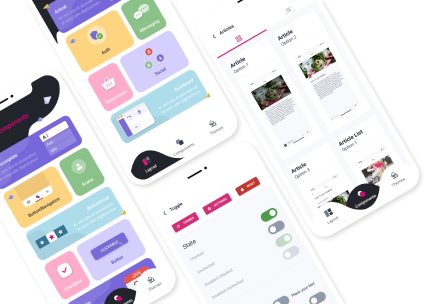What is ASP.NET MVC?
If you're interested in web development, chances are you've heard of ASP.NET MVC. But what exactly is it? In this comprehensive guide, we'll explore the ins and outs of ASP.NET MVC, including what it is, how it works, and why it's become such a popular choice for developers.

Understanding ASP.NET MVC: An Overview
ASP.NET MVC (Model-View-Controller) is an open-source framework for building web applications using Microsoft .NET. It allows developers to create dynamic websites and applications by separating the data model, user interface, and control logic into distinct components.
The Benefits of ASP.NET MVC
So, why should you choose ASP.NET MVC over other web development frameworks? Here are just a few of the benefits:
Separation of Concerns
One of the primary benefits of ASP.NET MVC is its separation of concerns. By dividing the application into distinct components, developers can more easily manage and maintain their codebase. This approach also makes it easier to test individual components, ensuring that the application is functioning as intended.
Flexibility
Another advantage of ASP.NET MVC is its flexibility. Because the framework is open source, developers have access to a wide range of tools and resources that can be used to customize their applications. This means that ASP.NET MVC can be used to build applications of varying complexities, from small personal websites to large enterprise-level systems.
Scalability
ASP.NET MVC is also highly scalable, making it an excellent choice for organizations that anticipate significant growth in their traffic or user base. Its ability to handle high volumes of traffic ensures that your application will continue to perform well even as it grows.
Security
Finally, ASP.NET MVC is well-known for its robust security features. The framework includes built-in protection against common web vulnerabilities like cross-site scripting (XSS) and SQL injection attacks. This can help ensure that your application is secure and protected from malicious actors.
Frequently Asked Questions
Q: What are the key components of an ASP.NET MVC application?
A: An ASP.NET MVC application consists of three primary components:
- Models, which represent the data used in the application
- Views, which define how the data is presented to users
- Controllers, which handle user input and serve as the intermediary between the model and view components
Q: What programming languages can be used with ASP.NET MVC?
A: ASP.NET MVC supports several programming languages, including C#, Visual Basic, F#, and others.
Q: Is ASP.NET MVC difficult to learn for beginners?
A: While there is a learning curve associated with any new framework or technology, ASP.NET MVC is generally considered to be beginner-friendly. There are many resources available online to help developers get started, and the framework itself is well-documented.
Q: Can ASP.NET MVC be used to build mobile applications?
A: While ASP.NET MVC is primarily designed for web development, it can be used to build mobile applications using Xamarin, a platform for creating cross-platform mobile apps using .NET.
Q: How does ASP.NET MVC compare to other web development frameworks like Ruby on Rails or Django?
A: All of these frameworks have their own strengths and weaknesses, and the best choice will depend on the specific needs of your project. However, ASP.NET MVC is often preferred by organizations that use Microsoft technologies for their backend systems, as it integrates seamlessly with other Microsoft tools and services.
Conclusion
ASP.NET MVC is a powerful and flexible web development framework that has become increasingly popular in recent years. Its ability to separate concerns, scalability, and robust security features make it an excellent choice for developers looking to create dynamic and secure web applications. With its open-source nature and vast community support, ASP.NET MVC is sure to remain a top choice for web developers for years to come.
Related Blogs










